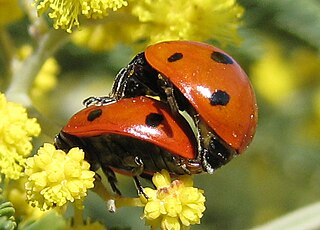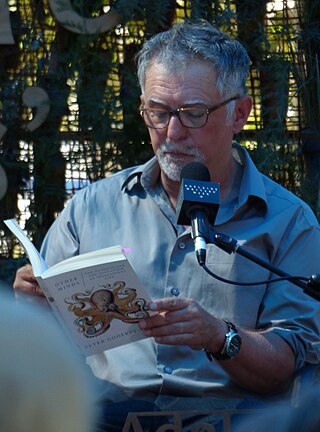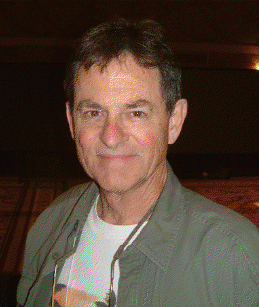
Darwinism is a theory of biological evolution developed by the English naturalist Charles Darwin (1809–1882) and others, stating that all species of organisms arise and develop through the natural selection of small, inherited variations that increase the individual's ability to compete, survive, and reproduce. Also called Darwinian theory, it originally included the broad concepts of transmutation of species or of evolution which gained general scientific acceptance after Darwin published On the Origin of Species in 1859, including concepts which predated Darwin's theories. English biologist Thomas Henry Huxley coined the term Darwinism in April 1860.

Reproduction is the biological process by which new individual organisms – "offspring" – are produced from their "parent" or parents. There are two forms of reproduction: asexual and sexual.

Theistic evolution is a view that God acts and creates through laws of nature. It posits that the concept of God is compatible with the findings of modern science, including evolution. Theistic evolution is not in itself a scientific theory, but includes a range of views about how science relates to religious beliefs and the extent to which God intervenes. It rejects the strict creationist doctrines of special creation, but can include beliefs such as creation of the human soul. Modern theistic evolution accepts the general scientific consensus on the age of the Earth, the age of the universe, the Big Bang, the origin of the Solar System, the origin of life, and evolution.

Sexual reproduction is an adaptive feature which is common to almost all multicellular organisms and various unicellular organisms. Currently, the adaptive advantage of sexual reproduction is widely regarded as a major unsolved problem in biology. As discussed below, one prominent theory is that sex evolved as an efficient mechanism for producing variation, and this had the advantage of enabling organisms to adapt to changing environments. Another prominent theory, also discussed below, is that a primary advantage of outcrossing sex is the masking of the expression of deleterious mutations. Additional theories concerning the adaptive advantage of sex are also discussed below. Sex does, however, come with a cost. In reproducing asexually, no time nor energy needs to be expended in choosing a mate and, if the environment has not changed, then there may be little reason for variation, as the organism may already be well-adapted. However, very few environments have not changed over the millions of years that reproduction has existed. Hence it is easy to imagine that being able to adapt to changing environment imparts a benefit. Sex also halves the amount of offspring a given population is able to produce. Sex, however, has evolved as the most prolific means of species branching into the tree of life. Diversification into the phylogenetic tree happens much more rapidly via sexual reproduction than it does by way of asexual reproduction.

Michael Ruse is a British-born Canadian philosopher of science who specializes in the philosophy of biology and works on the relationship between science and religion, the creation–evolution controversy, and the demarcation problem within science. Ruse currently teaches at Florida State University.

In creationism, a religious view based on a literal reading of the Book of Genesis and other biblical texts, created kinds are purported to be the original forms of life as they were created by God. They are also referred to in creationist literature as kinds, original kinds, Genesis kinds, and baramins.
Dorion Sagan is an American essayist, fiction writer, poet, and theorist of ecology. He has written and co-authored books on culture, art, literature, evolution, and the history and philosophy of science, including Cosmic Apprentice,Cracking the Aging Code, and Lynn Margulis: The Life and Legacy of a Scientific Rebel.
Olivia P. Judson is a British evolutionary biologist and science writer. She is a former journalist for The Economist, a former online columnist for The New York Times and has published in a number of other publications, including National Geographic, The Atlantic and the Financial Times. Judson was a fellow of the Berlin Institute for Advanced Study in 2010–2011, and a Guggenheim fellow in 2020.
Robert Ludlow "Bob" Trivers is an American evolutionary biologist and sociobiologist. Trivers proposed the theories of reciprocal altruism (1971), parental investment (1972), facultative sex ratio determination (1973), and parent–offspring conflict (1974). He has also contributed by explaining self-deception as an adaptive evolutionary strategy and discussing intragenomic conflict.
In biology, saltation is a sudden and large mutational change from one generation to the next, potentially causing single-step speciation. This was historically offered as an alternative to Darwinism. Some forms of mutationism were effectively saltationist, implying large discontinuous jumps.
Horace Freeland Judson was a journalist and later with more prominence a historian of molecular biology including authoring several books, including The Eighth Day of Creation, a history of molecular biology, and The Great Betrayal: Fraud in Science, an examination of the deliberate manipulation of scientific data.
Hindus have found support for, or ideas foreshadowing evolutionary ideas, in scriptures, such as the mytheme of Dashavatara, the incarnations of Vishnu starting with a fish.

Mchenga eucinostomus is a species of fish in the family Cichlidae. It is found in Malawi, Mozambique, and Tanzania. Its natural habitat is freshwater lakes.
A cognitive module in cognitive psychology is a specialized tool or sub-unit that can be used by other parts to resolve cognitive tasks. It is used in theories of the modularity of mind and the closely related society of mind theory and was developed by Jerry Fodor. It became better known throughout cognitive psychology by means of his book, The Modularity of Mind (1983). The nine aspects he lists that make up a mental module are domain specificity, mandatory operation, limited central accessibility, fast processing, informational encapsulation, "shallow" outputs, fixed neural architecture, characteristic and specific breakdown patterns, and characteristic ontogenetic pace and sequencing. Not all of these are necessary for the unit to be considered a module, but they serve as general parameters.
Kim Sterelny is an Australian philosopher and professor of philosophy in the Research School of Social Sciences at Australian National University and Victoria University of Wellington. He is the winner of several international prizes in the philosophy of science, and was previously editor of Biology and Philosophy. He is also a member of the Australian Academy of the Humanities. He is currently the First Vice President of the Division for Logic, Methodology and Philosophy of Science and Technology of the International Union of History and Philosophy of Science and Technology (2020–2023).

Peter Godfrey-Smith is an Australian philosopher of science and writer, who is currently Professor of History and Philosophy of Science at the University of Sydney. He works primarily in philosophy of biology and philosophy of mind, and also has interests in general philosophy of science, pragmatism, and some parts of metaphysics and epistemology. Godfrey-Smith was elected to the American Philosophical Society in 2022.

Evolutionary thought, the recognition that species change over time and the perceived understanding of how such processes work, has roots in antiquity—in the ideas of the ancient Greeks, Romans, Chinese, Church Fathers as well as in medieval Islamic science. With the beginnings of modern biological taxonomy in the late 17th century, two opposed ideas influenced Western biological thinking: essentialism, the belief that every species has essential characteristics that are unalterable, a concept which had developed from medieval Aristotelian metaphysics, and that fit well with natural theology; and the development of the new anti-Aristotelian approach to modern science: as the Enlightenment progressed, evolutionary cosmology and the mechanical philosophy spread from the physical sciences to natural history. Naturalists began to focus on the variability of species; the emergence of palaeontology with the concept of extinction further undermined static views of nature. In the early 19th century prior to Darwinism, Jean-Baptiste Lamarck (1744–1829) proposed his theory of the transmutation of species, the first fully formed theory of evolution.
Bateman's principle, in evolutionary biology, is that in most species, variability in reproductive success is greater in males than in females. It was first proposed by Angus John Bateman (1919–1996), an English geneticist. Bateman suggested that, since males are capable of producing millions of sperm cells with little effort, while females invest much higher levels of energy in order to nurture a relatively small number of eggs, the female plays a significantly larger role in their offspring's reproductive success. Bateman's paradigm thus views females as the limiting factor of parental investment, over which males will compete in order to copulate successfully.

Randy Thornhill is an American entomologist and evolutionary biologist. He is a professor of biology at the University of New Mexico, and was president of the Human Behavior and Evolution Society from 2011 to 2013. He is known for his evolutionary explanation of rape as well as his work on insect mating systems and the parasite-stress theory.
Although biological evolution has been vocally opposed by some religious groups, many other groups accept the scientific position, sometimes with additions to allow for theological considerations. The positions of such groups are described by terms including "theistic evolution", "theistic evolutionism" or "evolutionary creation". Of all the religious groups included on the chart, Buddhists are the most accepting of evolution. Theistic evolutionists believe that there is a God, that God is the creator of the material universe and all life within, and that biological evolution is a natural process within that creation. Evolution, according to this view, is simply a tool that God employed to develop human life. According to the American Scientific Affiliation, a Christian organization of scientists:
A theory of theistic evolution (TE) — also called evolutionary creation — proposes that God's method of creation was to cleverly design a universe in which everything would naturally evolve. Usually the "evolution" in "theistic evolution" means Total Evolution — astronomical evolution and geological evolution plus chemical evolution and biological evolution — but it can refer only to biological evolution.









